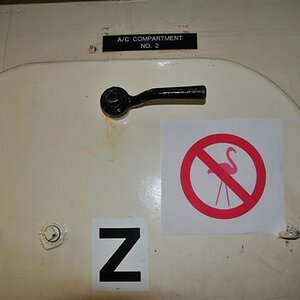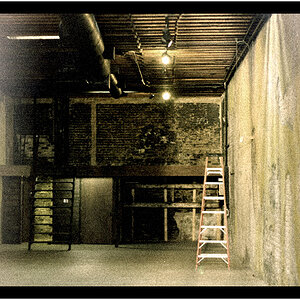Navigation
Install the app
How to install the app on iOS
Follow along with the video below to see how to install our site as a web app on your home screen.

Note: This feature currently requires accessing the site using the built-in Safari browser.
More options
You are using an out of date browser. It may not display this or other websites correctly.
You should upgrade or use an alternative browser.
You should upgrade or use an alternative browser.
Question on rights
- Thread starter rob91
- Start date
monkeykoder
TPF Noob!
- Joined
- Nov 19, 2007
- Messages
- 4,143
- Reaction score
- 0
- Location
- Sacramento CA
- Can others edit my Photos
- Photos OK to edit
Ok so if confescation of photo equiptment is illegal, why do the security guards of actors get away with destroying equiptment? I know law fees are expensive but what is the difference, a photographer (granted in this situation would probably be papparatzi) gets his equiptment taken away and destroyed over a photo, are the laws on this situation different for personal safety and well being? And are the laws different in various countries than they are here in the US?
It isn't legal but guess what there is no one to sue for it the body guard has no money and as long as the person they are protecting didn't TELL them to do it you can't sue them.
Big Bully
TPF Noob!
- Joined
- Jun 18, 2007
- Messages
- 6,620
- Reaction score
- 0
- Location
- Burley ID
- Can others edit my Photos
- Photos NOT OK to edit
It isn't legal but guess what there is no one to sue for it the body guard has no money and as long as the person they are protecting didn't TELL them to do it you can't sue them.
So basically either way you as the photographer are screwed?!
monkeykoder
TPF Noob!
- Joined
- Nov 19, 2007
- Messages
- 4,143
- Reaction score
- 0
- Location
- Sacramento CA
- Can others edit my Photos
- Photos OK to edit
you might recoup your losses on equipment and with digital you probably wouldn't lose the pictures (memory cards are a relatively easy to damage but they are being padded by the equipment.)
RMThompson
the TPF moderators rock my world!
- Joined
- Nov 12, 2006
- Messages
- 1,888
- Reaction score
- 11
- Can others edit my Photos
- Photos NOT OK to edit
So basically either way you as the photographer are screwed?!
No.
Monkeyloder said the Security Guard has no money, and therefore you could not sue him, which is probably untrue:
For one, stereoptyping that security guards have no money is lazy and to a security guard, probably rude. I am positive security guards get paid an honest wage for their work, and unless the suggestion is that all security guards are bad with money I am sure most "have money" so to speak.
Secondly, lets assume the security guard doesn't "have money", he confiscates your equipment and destroys it. If you win the ensuing legal battle, and you should, he is now required by law to pay it to you within 7 years.
Lastly, the problem here may lie in the misconception that someone does you wrong, and you can sue them for enough money to pay you for the rest of your life. If someone breaks your camera equipment, you can sue them for that amount, nothing more. If they destroyed photos that may have made you a profit, you may sue for those residual losses, but you're not going to get millions of dollars... after all, a broken camera is no hot cup of coffee on your lap.
Big Bully
TPF Noob!
- Joined
- Jun 18, 2007
- Messages
- 6,620
- Reaction score
- 0
- Location
- Burley ID
- Can others edit my Photos
- Photos NOT OK to edit
No.
Monkeyloder said the Security Guard has no money, and therefore you could not sue him, which is probably untrue:
For one, stereoptyping that security guards have no money is lazy and to a security guard, probably rude. I am positive security guards get paid an honest wage for their work, and unless the suggestion is that all security guards are bad with money I am sure most "have money" so to speak.
Secondly, lets assume the security guard doesn't "have money", he confiscates your equipment and destroys it. If you win the ensuing legal battle, and you should, he is now required by law to pay it to you within 7 years.
Lastly, the problem here may lie in the misconception that someone does you wrong, and you can sue them for enough money to pay you for the rest of your life. If someone breaks your camera equipment, you can sue them for that amount, nothing more. If they destroyed photos that may have made you a profit, you may sue for those residual losses, but you're not going to get millions of dollars... after all, a broken camera is no hot cup of coffee on your lap.
Also to add to that, the bodyguard, is protecting the rich and famous, he is definately going to be paid well for his services. Otherwise, to him what would be the point?
monkeykoder
TPF Noob!
- Joined
- Nov 19, 2007
- Messages
- 4,143
- Reaction score
- 0
- Location
- Sacramento CA
- Can others edit my Photos
- Photos OK to edit
No.
Monkeyloder said the Security Guard has no money, and therefore you could not sue him, which is probably untrue:
For one, stereoptyping that security guards have no money is lazy and to a security guard, probably rude. I am positive security guards get paid an honest wage for their work, and unless the suggestion is that all security guards are bad with money I am sure most "have money" so to speak.
Secondly, lets assume the security guard doesn't "have money", he confiscates your equipment and destroys it. If you win the ensuing legal battle, and you should, he is now required by law to pay it to you within 7 years.
Lastly, the problem here may lie in the misconception that someone does you wrong, and you can sue them for enough money to pay you for the rest of your life. If someone breaks your camera equipment, you can sue them for that amount, nothing more. If they destroyed photos that may have made you a profit, you may sue for those residual losses, but you're not going to get millions of dollars... after all, a broken camera is no hot cup of coffee on your lap.
By no money I'm talking no money relative to the person they are protecting. If Brittney Spears wrecked your gear you could probably get equipment replaced and money for lost income due to the loss of your livelihood. The security guard the court would probably go lightly on and just go for replacing the gear.
skieur
TPF Noob!
- Joined
- May 14, 2007
- Messages
- 5,071
- Reaction score
- 204
- Location
- Canada
- Can others edit my Photos
- Photos OK to edit
Ok so if confescation of photo equiptment is illegal, why do the security guards of actors get away with destroying equiptment? I know law fees are expensive but what is the difference, a photographer (granted in this situation would probably be papparatzi) gets his equiptment taken away and destroyed over a photo, are the laws on this situation different for personal safety and well being? And are the laws different in various countries than they are here in the US?
With celebrities things are a little different. In courts in Europe, the point has been presented that celebrities can have a valid expectation of privacy if they are not engaged in newsworthy activities. This has met with mixed response in the courts. Related to Princess Caroline in Germany the ruling was that the parents as celebrities did not have a valid expectation to privacy in public but their children did. That ruling is subject to appeal.
Also, like probably many people here, the photographer has not been sufficiently knowledgeable in the law to take the most efficient and effective legal steps to win. When I taught brilliantly intelligent students for 2 years, I emphasized that there are always alternatives and options when facing problems. Think beyond as well as outside of the box. When it comes to legal problems think legally, think specifically of the laws as written, think politically and use the media. Also adapt quickly to changes. In some cases you would be surprised at the sources of unexpected support for you in such fights.
Even within government and political organizations there are still a few idealists who take individual rights seriously.
skieur
skieur
TPF Noob!
- Joined
- May 14, 2007
- Messages
- 5,071
- Reaction score
- 204
- Location
- Canada
- Can others edit my Photos
- Photos OK to edit
It isn't legal but guess what there is no one to sue for it the body guard has no money and as long as the person they are protecting didn't TELL them to do it you can't sue them.
You don't know the law. The body guard or the security guard is a representative of the celebrity or a company/organization. Standard procedure is sue the celebrity or the company and they are liable for the actions of their employees.
The proof of that is the little known fact that many organizations automatically cover their employees against lawsuits. One organization I worked for covered the $60,000 lawsuit caused by an employee who said on national television that he violated the copyright of a major movie producer and another senior employee who technically accused someone in public of a criminal offence.
skieur
Big Bully
TPF Noob!
- Joined
- Jun 18, 2007
- Messages
- 6,620
- Reaction score
- 0
- Location
- Burley ID
- Can others edit my Photos
- Photos NOT OK to edit
You don't know the law. The body guard or the security guard is a representative of the celebrity or a company/organization. Standard procedure is sue the celebrity or the company and they are liable for the actions of their employees.
The proof of that is the little known fact that many organizations automatically cover their employees against lawsuits.
skieur
But you have to have a good lawyer to do battle against their lawyers, and usually those who have the money has the power...
skieur
TPF Noob!
- Joined
- May 14, 2007
- Messages
- 5,071
- Reaction score
- 204
- Location
- Canada
- Can others edit my Photos
- Photos OK to edit
As far as security destroying equipment, in many cases the wrong approach is taken.
The first step in many cases should be laying a charge of assault, theft, and vandalism and doing it legally as well as politically. Get the media involved, use the internet, but make sure that anything you say is on the legal side of defamation or libel. Security guards have supervisory personnel, licensing bodies, etc. Get them involved. Politicians have views on security issues. Talk to any who would be sympathetic. Make your situation an issue with potential political fallout. Get rights organizations and photographic organizations involved too. Use the editorial pages to quote the views and responses that you have received.
Then if things go your way, pick the right moment to follow up with a well-designed lawsuit that covers your reputation, time, expenses, and perhaps even naming more defendants. Punitive damages may also be warranted depending on how the situation developes.
skieur
The first step in many cases should be laying a charge of assault, theft, and vandalism and doing it legally as well as politically. Get the media involved, use the internet, but make sure that anything you say is on the legal side of defamation or libel. Security guards have supervisory personnel, licensing bodies, etc. Get them involved. Politicians have views on security issues. Talk to any who would be sympathetic. Make your situation an issue with potential political fallout. Get rights organizations and photographic organizations involved too. Use the editorial pages to quote the views and responses that you have received.
Then if things go your way, pick the right moment to follow up with a well-designed lawsuit that covers your reputation, time, expenses, and perhaps even naming more defendants. Punitive damages may also be warranted depending on how the situation developes.
skieur
Big Bully
TPF Noob!
- Joined
- Jun 18, 2007
- Messages
- 6,620
- Reaction score
- 0
- Location
- Burley ID
- Can others edit my Photos
- Photos NOT OK to edit
As far as security destroying equipment, in many cases the wrong approach is taken.
The first step in many cases should be laying a charge of assault, theft, and vandalism and doing it legally as well as politically. Get the media involved, use the internet, but make sure that anything you say is on the legal side of defamation or libel. Security guards have supervisory personnel, licensing bodies, etc. Get them involved. Politicians have views on security issues. Talk to any who would be sympathetic. Make your situation an issue with potential political fallout. Get rights organizations and photographic organizations involved too. Use the editorial pages to quote the views and responses that you have received.
Then if things go your way, pick the right moment to follow up with a well-designed lawsuit that covers your reputation, time, expenses, and perhaps even naming more defendants. Punitive damages may also be warranted depending on how the situation developes.
skieur
Wow you know a lot on this topic.
Mike_E
No longer a newbie, moving up!
- Joined
- Jan 26, 2007
- Messages
- 5,327
- Reaction score
- 266
- Can others edit my Photos
- Photos OK to edit
A very smart guy once said that 'If you are finding life difficult, it just means that you are doing it wrong'.
Either 1, shoot someplace where the goons aren't going to bust your head or 2, arrange with the powers that be to get permission so the goons won't bust your head or C, bring your own goons and shoot while both groups of goons are busting each other's heads.
Either 1, shoot someplace where the goons aren't going to bust your head or 2, arrange with the powers that be to get permission so the goons won't bust your head or C, bring your own goons and shoot while both groups of goons are busting each other's heads.
skieur
TPF Noob!
- Joined
- May 14, 2007
- Messages
- 5,071
- Reaction score
- 204
- Location
- Canada
- Can others edit my Photos
- Photos OK to edit
But you have to have a good lawyer to do battle against their lawyers, and usually those who have the money has the power...
My point however is that the cost of hiring a lawyer to accompany you to a prosecutors office with a reporter to lay theft, possession of stolen proprerty, assault, perhaps unlawful confinement, etc. will not be high.
If you get a local politician involved that will also increase the pressure on the prosecutor.
Technically, there is no reason in law for the charges not to be laid. All that needs to be shown is that a camera, etc. was taken from a photographer without permission, that the photographer was perhaps intimidated/assaulted/confined etc. The onus is on others to defend those actions not on the photographer. There are approaches to dealing with a reluctant prosecutor too.
If the charges are laid, then the photographer is more than halfway there in wining any potential follow-up law suit and if there is a conviction, it is almost ensured. Needless to say, any potential lawsuit needs to cover your legal fees and all other expenses on top of any punitive damages.
skieur
Big Bully
TPF Noob!
- Joined
- Jun 18, 2007
- Messages
- 6,620
- Reaction score
- 0
- Location
- Burley ID
- Can others edit my Photos
- Photos NOT OK to edit
My point however is that the cost of hiring a lawyer to accompany you to a prosecutors office with a reporter to lay theft, possession of stolen proprerty, assault, perhaps unlawful confinement, etc. will not be high.
If you get a local politician involved that will also increase the pressure on the prosecutor.
Technically, there is no reason in law for the charges not to be laid. All that needs to be shown is that a camera, etc. was taken from a photographer without permission, that the photographer was perhaps intimidated/assaulted/confined etc. The onus is on others to defend those actions not on the photographer. There are approaches to dealing with a reluctant prosecutor too.
If the charges are laid, then the photographer is more than halfway there in wining any potential follow-up law suit and if there is a conviction, it is almost ensured. Needless to say, any potential lawsuit needs to cover your legal fees and all other expenses on top of any punitive damages.
skieur
Not bad... Have you done this before? Is that how you know all abou this?
Similar threads
- Replies
- 13
- Views
- 2K












